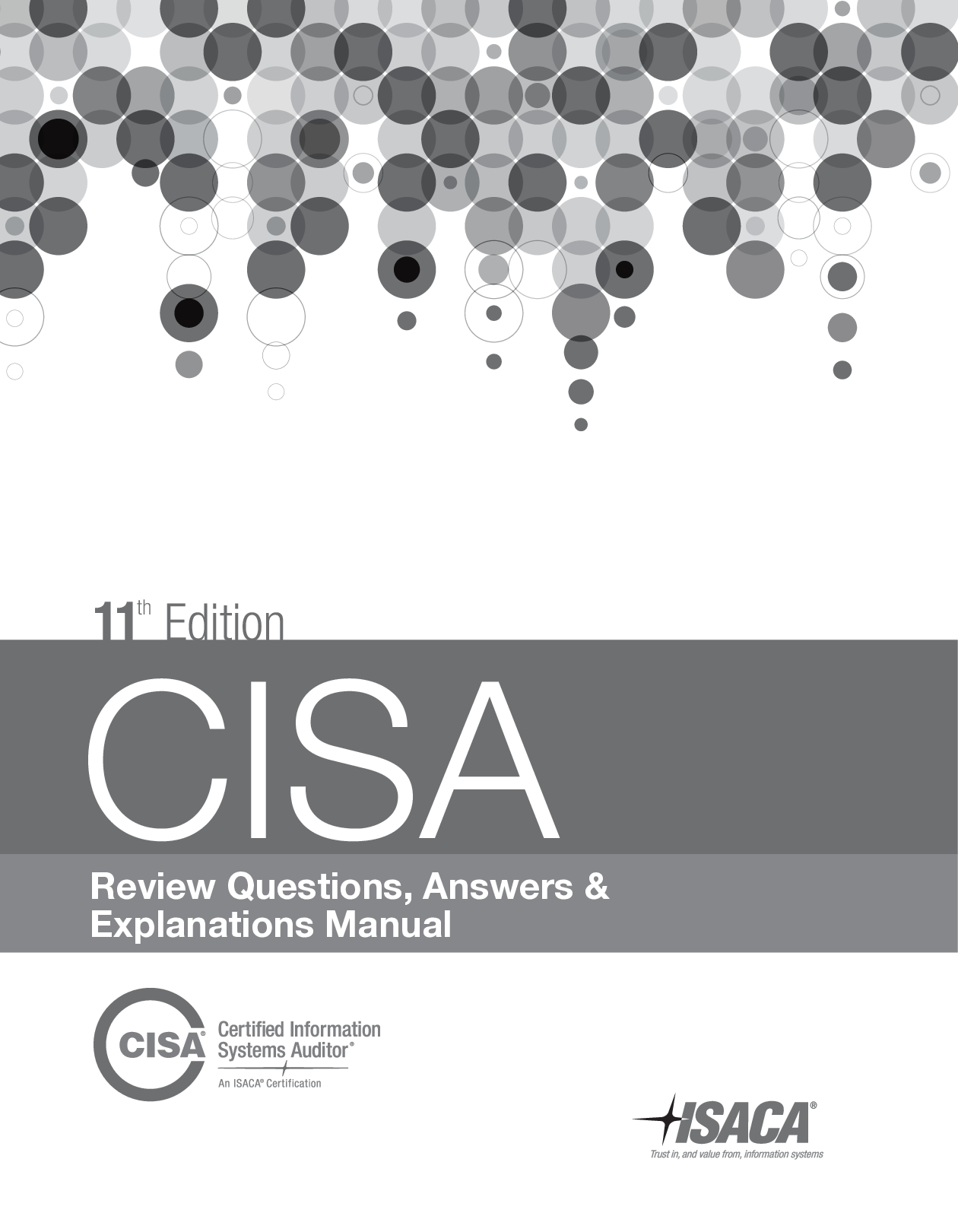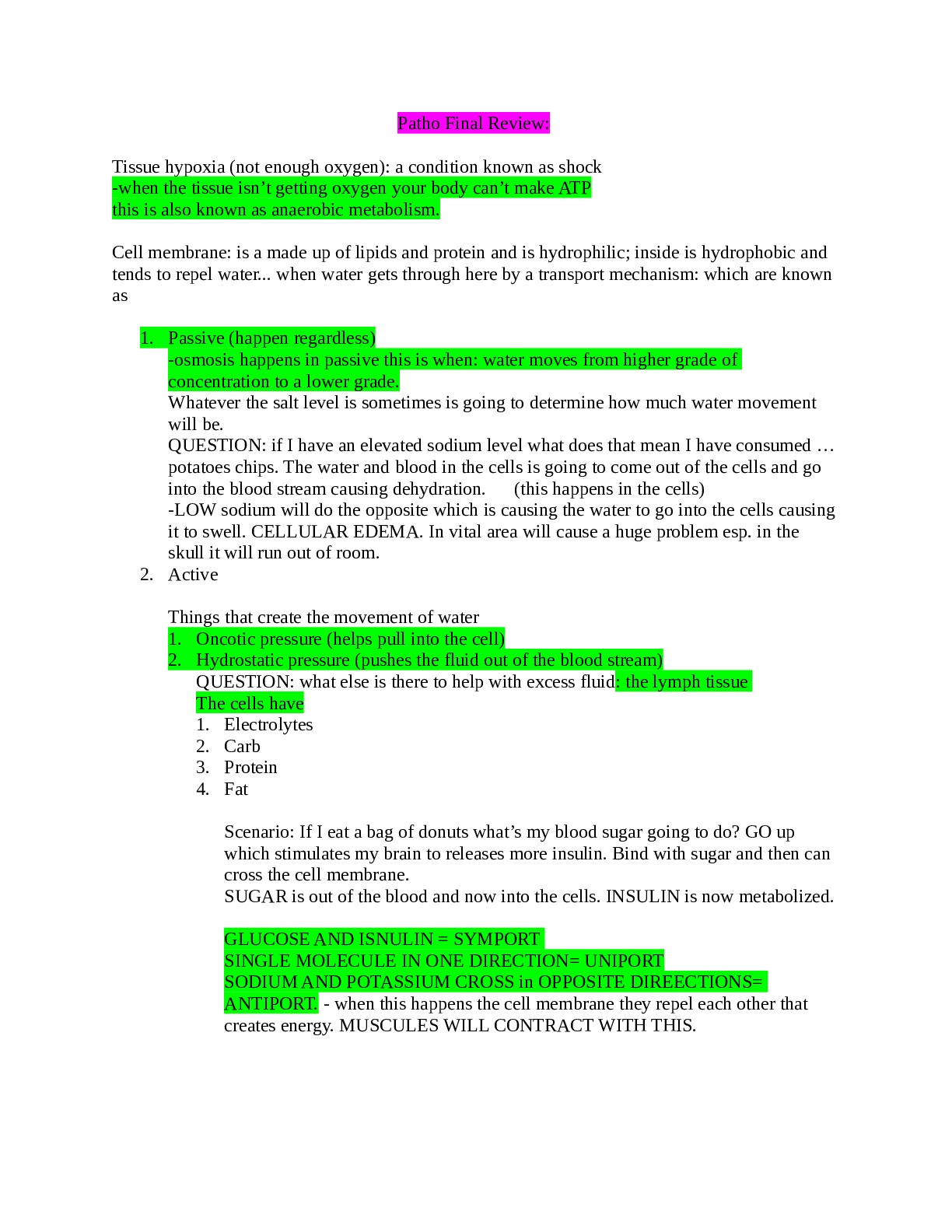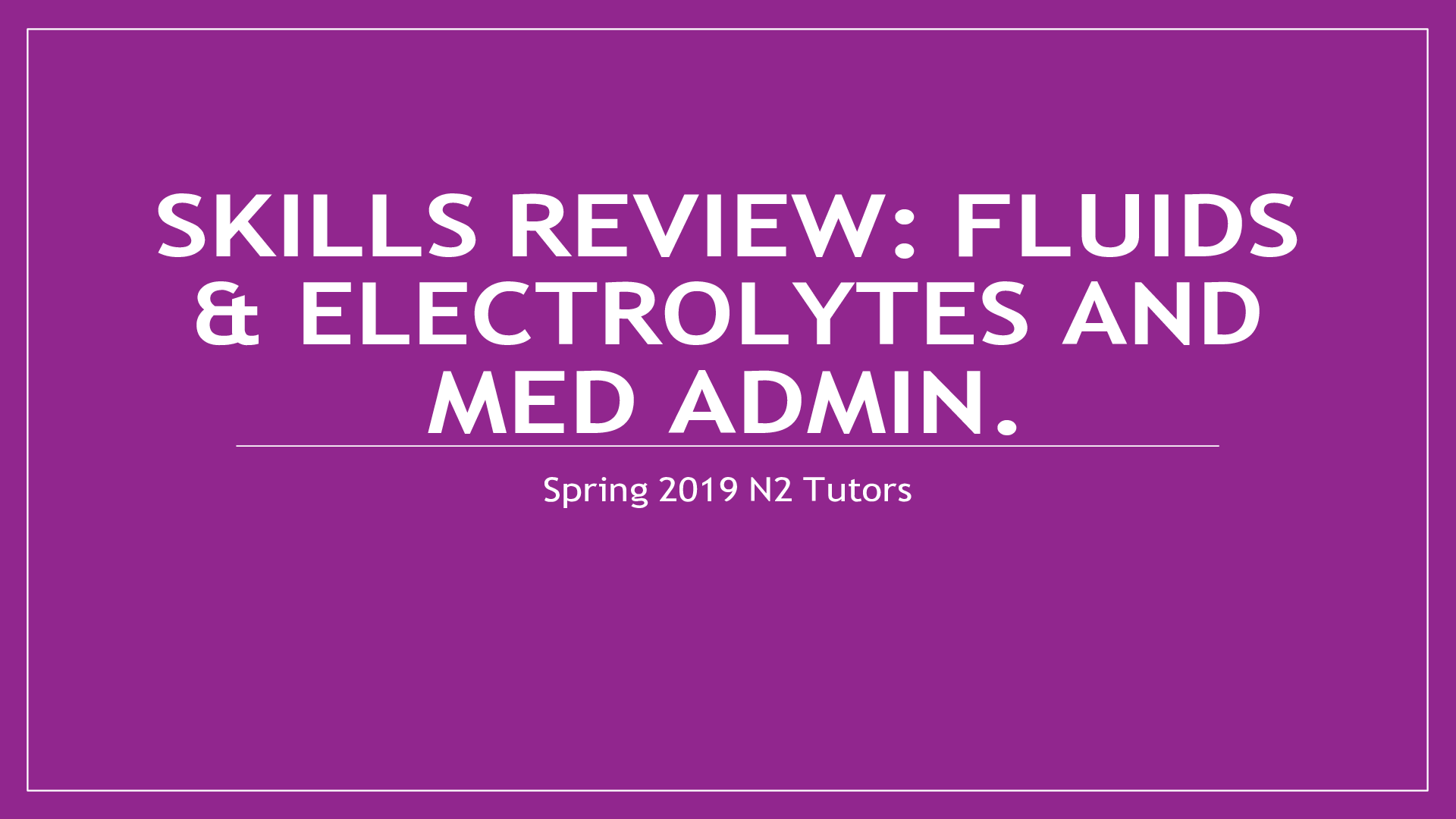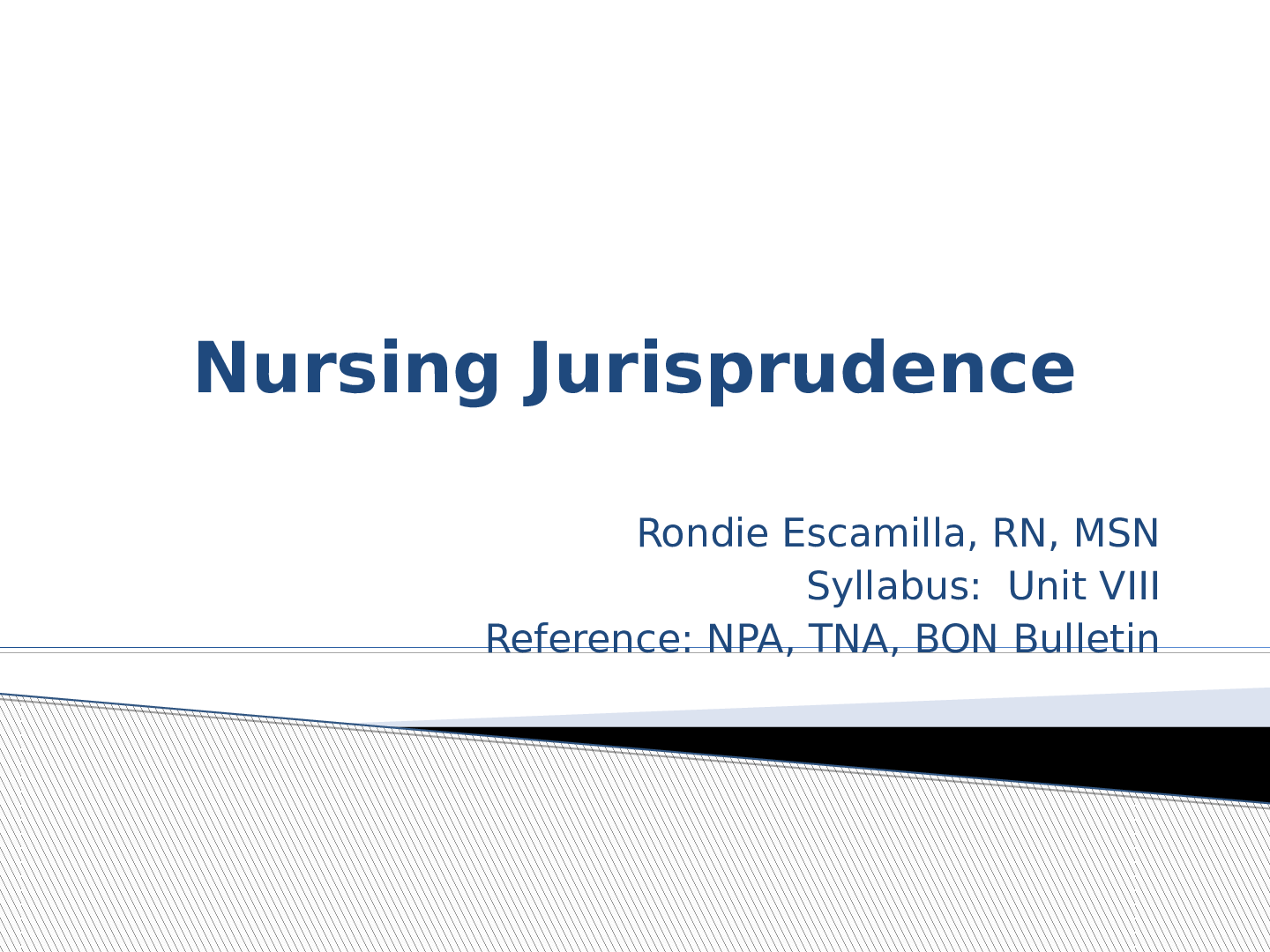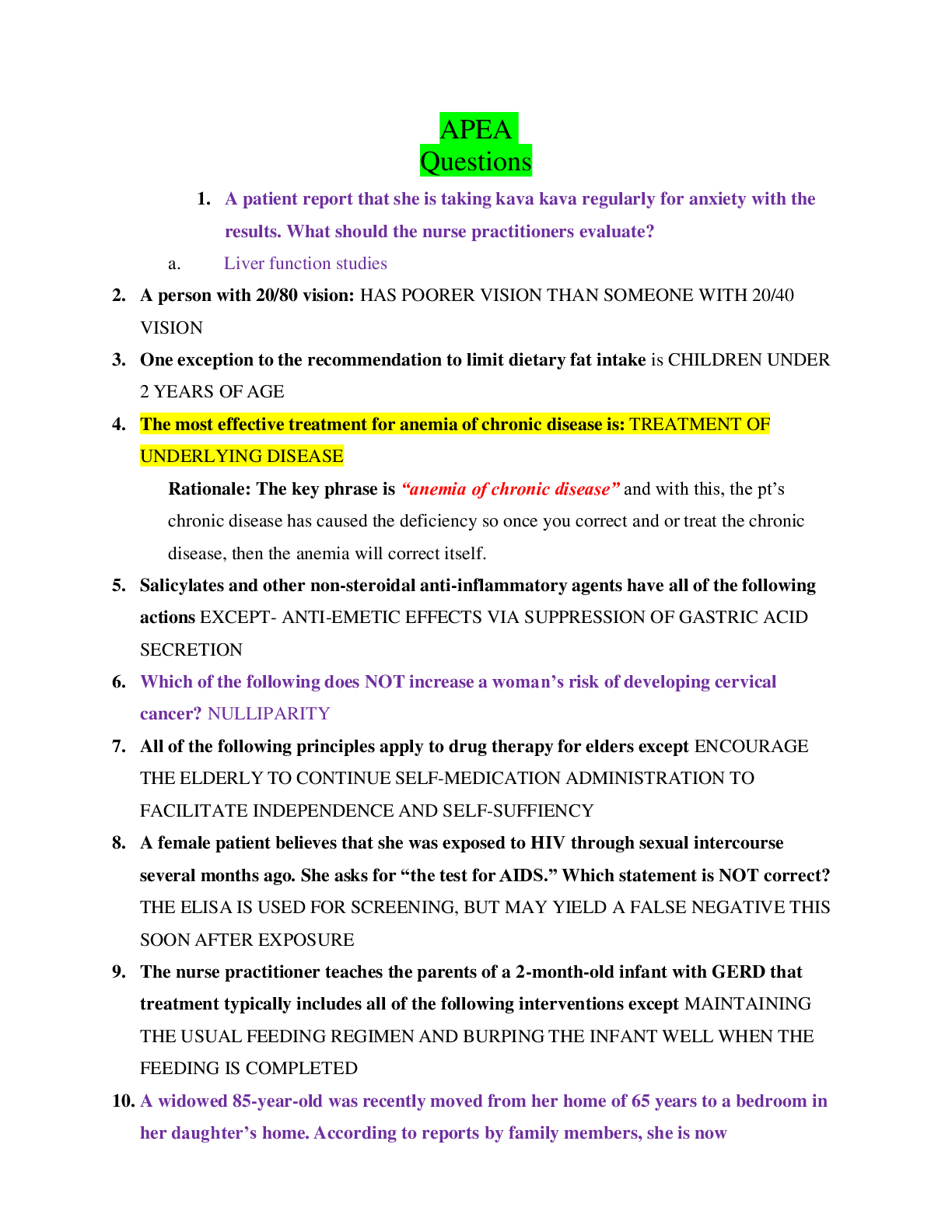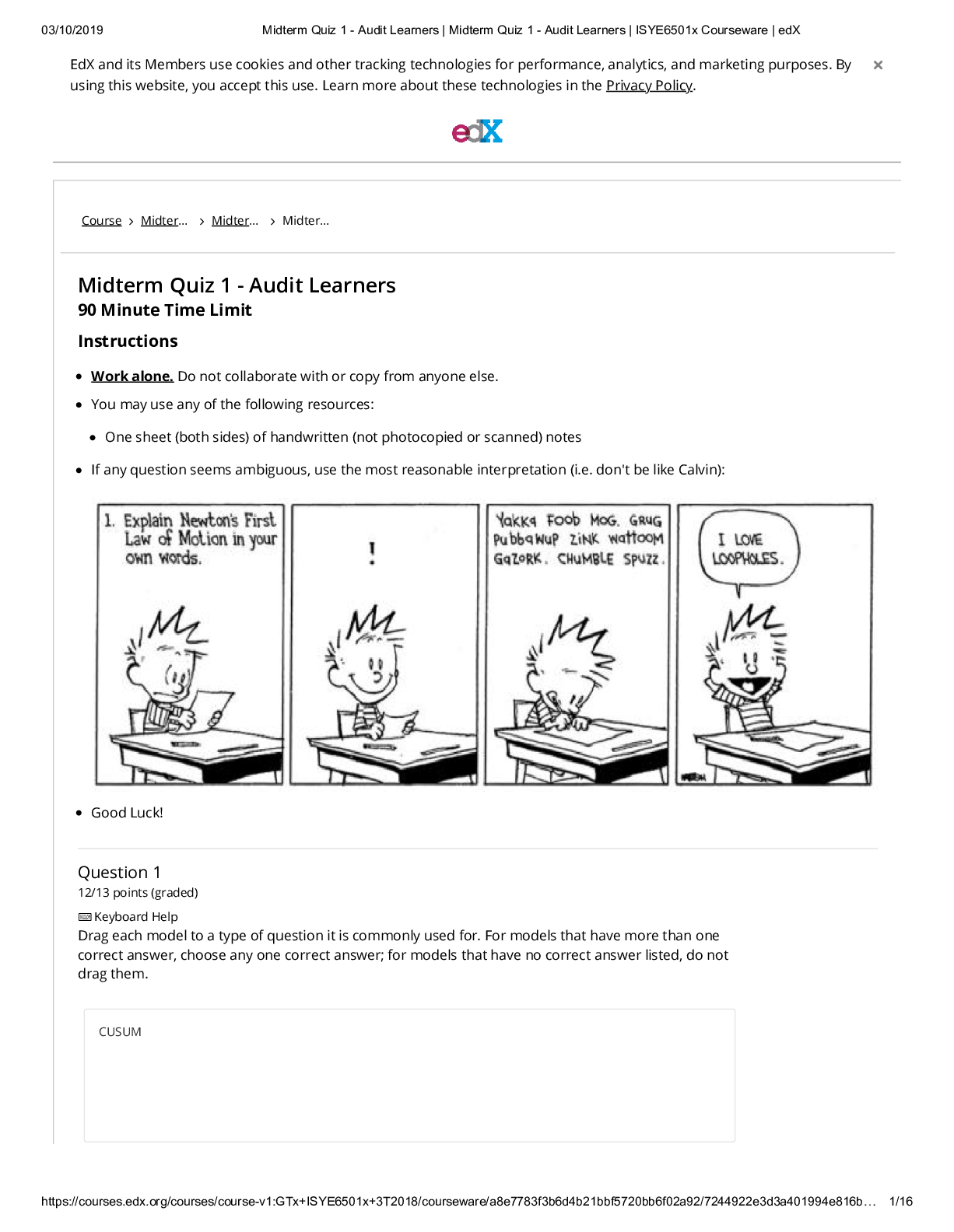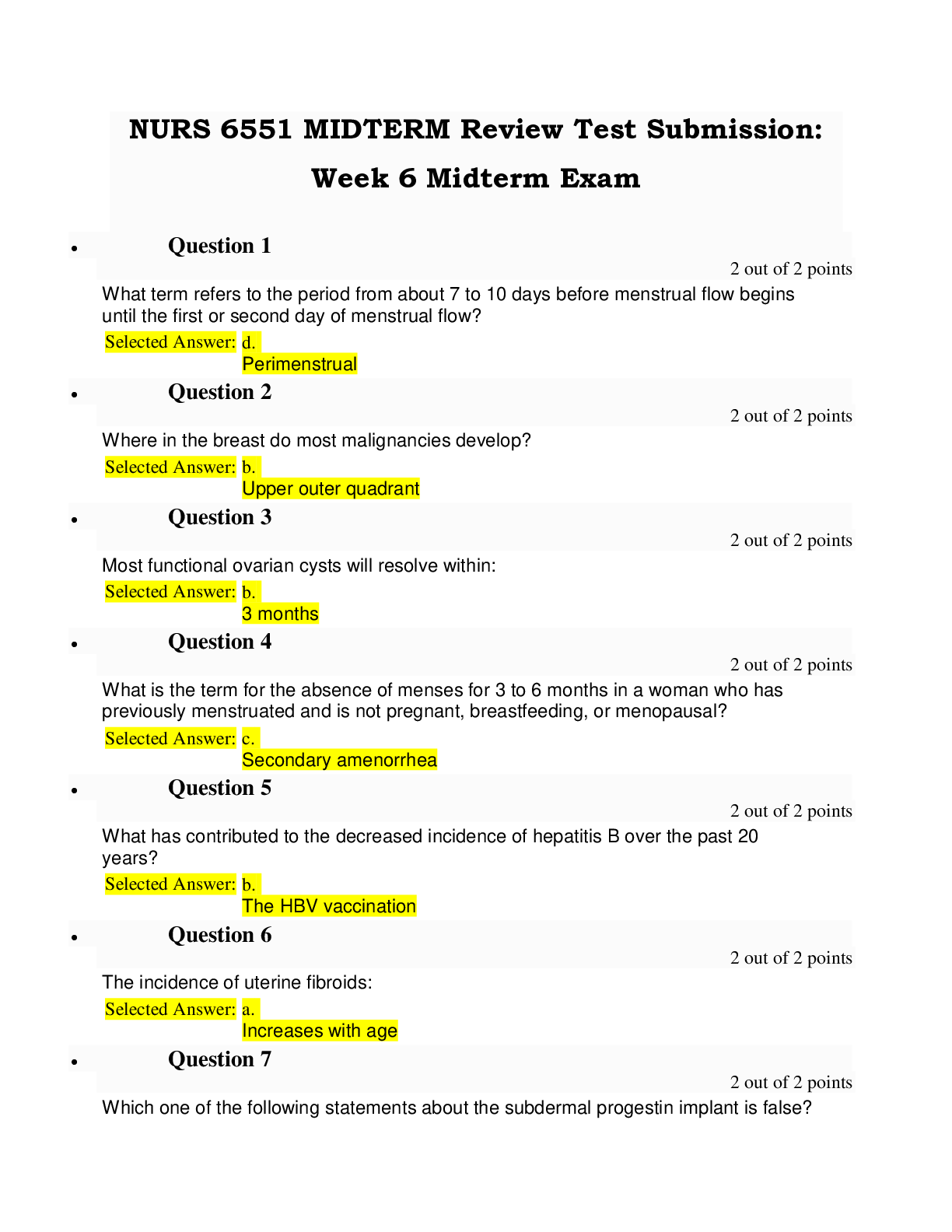*NURSING > EXAM REVIEW > Review Test Submission: Week 6 Midterm Exam 100% CORRECT ANSWERS (All)
Review Test Submission: Week 6 Midterm Exam 100% CORRECT ANSWERS
Document Content and Description Below
Review Test Submission: Week 6 Midterm Exam Course NURS-6630N-7, Test Week 6 Midterm Exam Started 1/4/19 9:14 PM Submitted 1/4/19 9:59 PM Due Date 1/7/19 1:59 AM Status Completed Attempt Sco... re 64 out of 75 points Time Elapsed 44 minutes out of 2 hours Results Displayed Submitted Answers • Question 1 0 out of 1 points A noncompliant patient states, “Why do you want me to put this poison in my body?” Identify the best response made by the psychiatric-mental health nurse practitioner (PMHNP). Selected Answer: • Question 2 0 out of 1 points Ms. Hill is currently being treated for schizophrenia but has stopped taking her medications due to some side effects she claims she was experiencing. She presents to the clinic today with worsening symptoms. She is experiencing anhedonia, agitation, attentional impairment, and affective blunting. Which one of the symptoms mentioned is considered a positive symptom of schizophrenia? Selected Answer: • Question 3 1 out of 1 points Which statement about neurotransmitters and medications is true? Selected Answer: • Question 4 1 out of 1 points When an unstable patient asks why it is necessary to add medications to his current regimen, the PMHNP’s best response would be: Selected Answer: • Question 5 1 out of 1 points During gene expression, what must occur prior to a gene being expressed? Selected Answers: • Question 6 1 out of 1 points While genes have potential to modify behavior, behavior can also modify genes. How do genes impact this process? Selected Answer: • Question 7 1 out of 1 points Though medications have the ability to target neurotransmitter release into the synapse by the presynaptic neuron it is not always necessary. The PMHNP understands that this is because: Selected Answer: • Question 8 1 out of 1 points Why is the cytochrome P450 enzyme system of significance to the PMHNP? Selected Answer: • Question 9 1 out of 1 points It is important for the PMHNP to recognize differences in pharmacokinetics to safely prescribe and monitor medications. Which of the following statements does the competent PMHNP identify as true? • Question 10 1 out of 1 points As it relates to G-protein linked receptors, what does the PMHNP understand about medications that are used in practice? Selected Answer: • Question 11 1 out of 1 points The PMHNP is considering prescribing a 49-year-old male clozapine (Clozaril) to treat his schizophrenia and suicidal ideations. The PMHNP is aware that which factor may impact the dose needed to effectively treat his condition: Selected Answer: • Question 12 0 out of 1 points A patient is diagnosed with bipolar disorder and is currently taking carbamazepine (Tegretol), aripiprazole (Abilify), and melatonin. The PMHNP has just written an order to discontinue the carbamazepine (Tegretol) for drug-induced thrombocytopenia. The PMHNP is aware that his next best action is to: Selected Answer: • Question 13 1 out of 1 points A patient recently transferred following a suicide attempt has a history of schizophrenia, depression, and fibromyalgia. He is currently taking Amitriptyline (Elavil), Lisinopril, aspirin, and fluoxetine (Prozac). When assessing the psychiatric medications and the reason for admission, what would be the best course of action for the PMHNP with this client? Selected Answer: • Question 14 0 out of 1 points A patient with schizophrenia is given an inverse agonist that acts on the receptor 5HT and neurotransmitter serotonin. What is the rationale for prescribing a medication such as this? Selected Answer: • Question 15 1 out of 1 points The PMHNP is caring for four patients. Which patient statement indicates that benzodiazepines would be beneficial? • Question 16 1 out of 1 points Ms. Harlow is a 42-year-old patient who is prescribed a drug that acts on ionotropic receptors. She is curious about the effects of the drug and how it will act on her symptoms. Which statement made by the PMHNP demonstrates proper understanding of Ms. Harlow’s prescription? Selected Answer: • Question 17 1 out of 1 points A patient is seeking pharmacological treatment for smoking cessation. Which drug class does the PMHNP prescribe to the patient? Selected Answer: • Question 18 1 out of 1 points The PMHNP is caring for a new patient who has been transferred from another office. When meeting with the new patient, the patient reports, “I feel like I am improving with the stabilizers.” The PMHNP immediately recognizes that the patient is describing which kind of drug? Selected Answer: • Question 19 1 out of 1 points A patient presents with frequent episodes of mania. Which statement describes an appropriate treatment approach for this patient? • Question 20 1 out of 1 points What characteristics do the nicotinic, cholinergic, serotonin 3, and glycine receptors all have in common? Selected Answer: • Question 21 1 out of 1 points Which statement made by the patient suggests the patient will need to be treated with antipsychotics that target paranoid psychosis? Selected Answer: • Question 22 1 out of 1 points Mr. McCullin is 64 years old with Parkinson’s disease. The PMHNP caring for Mr. McCullin wants to start him on a dopamine agonist to help manage and treat his condition. The PHMNP selects this agent because of which action it has on patients like Mr. McCullin? Selected Answer: . • Question 23 1 out of 1 points Mrs. Trevor is a 44-year-old patient who does not have a diagnosis of schizophrenia but occasionally reports symptoms of psychosis, followed by severe fatigue. Mrs. Trevor inquires about the use of amphetamines to help with her energy levels. Which response made by the PMHNP is most appropriate? • Question 24 1 out of 1 points The PMHNP is caring for a patient with schizophrenia and is considering a variety of treatment approaches. The PHMNP selects a viable treatment that is consistent with the “dopamine hypothesis of schizophrenia.” What action does the PMHNP anticipate this treatment having on the patient? Selected Answer: • Question 25 0 out of 1 points A patient is diagnosed with schizophrenia. What increases the patient’s potential to mediate the cognitive symptoms of the disease? Selected Answer: • Question 26 1 out of 1 points What is accurate about the clinical description of psychosis? • Question 27 1 out of 1 points The PMNHP is assessing a 29-year-old client who takes antipsychotics that block D2 receptors. This client has begun to develop a common side effect of this medication. What is this side effect? Selected Answer: • Question 28 1 out of 1 points The PMHNP is caring for a patient who is taking antipsychotics heard the psychiatrist tell the patient that the patient would be placed on a different antipsychotic agent called an atypical antipsychotic. What neurotransmitters will this new medication work on? Selected Answer: • Question 29 1 out of 1 points Which statement made by the PMHNP exemplifies correct teaching of physiological effects in the body? Selected Answer: • Question 30 1 out of 1 points Mrs. Schwartzman is a 52-year-old patient with schizophrenia and no established history of depression. When meeting with the PMHNP, she presents with apathy and withdrawn social behavior, and she reports a loss of joy from enjoyable activities. What does the PMHNP infer from this encounter with the patient? Selected Answer: • Question 31 1 out of 1 points Mrs. Schwartzman is a 52-year-old client with schizophrenia and no established history of depression. When meeting with the PMHNP, she presents with apathy and withdrawn social behavior, and she reports a loss of joy from enjoyable activities since starting her new medication. What does the PMHNP infer from this encounter with the client? Selected Answer: • Question 32 1 out of 1 points The student inquires about antipsychotic medications. Which response by the PMHNP describes the factors that contribute to reduced risk of extrapyramidal symptoms (EPS) for patients who take antipsychotics? Selected Answer: • Question 33 0 out of 1 points Mr. Gordon is a middle-aged patient who is taking antipsychotics. When meeting with the PMHNP, he reports positive responses to the medication, stating, “I really feel as though the effects of my depression are going away.” Which receptor action in antipsychotic medications is believed to be the most beneficial in producing the effects described by Mr. Gordon? Selected Answer: • Question 34 1 out of 1 points Mr. Gordon is a middle-aged client who was started on antidepressant monotherapy for depression. After beginning this medication, the PMHNP noticed that this client seemed to swing into a hypomanic episode. What can the PMHNP infer from this behavior change? Selected Answer: • Question 35 1 out of 1 points Ms. Ryerson is a 28-year-old patient with a mood disorder. She recently requested to transfer to a new PMHNP, after not getting along well with her previous provider. The new PHMNP is reviewing Ms. Ryerson’s medical chart prior to their first appointment. Upon review, the PMHNP sees that the former provider last documented “patient had rapid poop out.” What does the PMHNP infer about the patient’s prescription based on this documentation? Selected Answer: . • Question 36 0 out of 1 points The PMHNP recognizes that which patient would be contraindicated for antidepressant monotherapy? Selected Answer: • Question 37 1 out of 1 points The PMHNP spends a session with a client and notices behaviors correlating with a potential manic episode. All of the following are possible manic symptoms the PMHNP could observe except: Selected Answer: • Question 38 1 out of 1 points The PMHNP is caring for a patient with the s genotype of SERT. What does the PMHNP understand regarding this patient’s response to selective serotonin reuptake inhibitor (SSRI)/SNRI treatment? • Question 39 1 out of 1 points Ms. Boeckh is a 42-year-old patient with major depression. The PMHNP understands that which action of norepinephrine will affect Ms. Boeckh’s serotonin levels? • Question 40 1 out of 1 points Ms. Boeckh is a 42-year-old client who is taking an antidepressant therapy. The PMHNP understands that this medication can have substantial food interactions that can cause Ms. Boeckh to develop a hypertensive crisis. Which antidepressant class is Ms. Boeckh’s medication in? Selected Answer: • Question 41 1 out of 1 points The PMHNP is assessing a patient in the psychiatric emergency room. The patient tells the PMHNP that he does not understand why his depression has not lifted after being on four different antidepressants over the course of a year. Which of the following symptoms can be residual symptoms for patients who do not achieve remission with major depressive disorder? Selected Answer: • Question 42 1 out of 1 points Fluoxetine (Prozac) has been prescribed for a patient. Which of the following statements is true regarding the action of this medication? Selected Answer: • Question 43 1 out of 1 points Fluoxetine (Prozac) has been prescribed for a client with depression. Which of the following statements is true regarding the action of this medication? Selected Answer: • Question 44 1 out of 1 points The nurse education knows that teaching was effective when one of the students compares fluvoxamine to sertraline and notes which of the following similarities? Selected Answer: . • Question 45 1 out of 1 points A 45 year old female client with allergic rhinitis and normal blood pressure has had no reduction in depressive symptoms after trying bupropion, paroxetine, and venlafaxine. What precautions are needed when considering phenelzine in treating her depression? Selected Answer: • Question 46 1 out of 1 points A 51-year-old female patient presents with symptoms of depression, including lack of motivation and difficulty sleeping. What risk factors would increase her vulnerability for a diagnosis of depression? • Question 47 1 out of 1 points ……………………………………….CONTINUED………………………………………….. [Show More]
Last updated: 1 year ago
Preview 1 out of 14 pages
Instant download

Buy this document to get the full access instantly
Instant Download Access after purchase
Add to cartInstant download
Reviews( 0 )
Document information
Connected school, study & course
About the document
Uploaded On
Feb 11, 2021
Number of pages
14
Written in
Additional information
This document has been written for:
Uploaded
Feb 11, 2021
Downloads
0
Views
40


